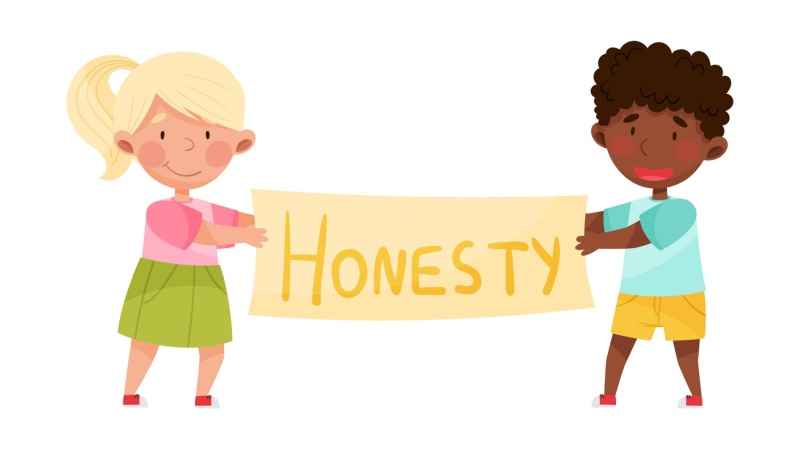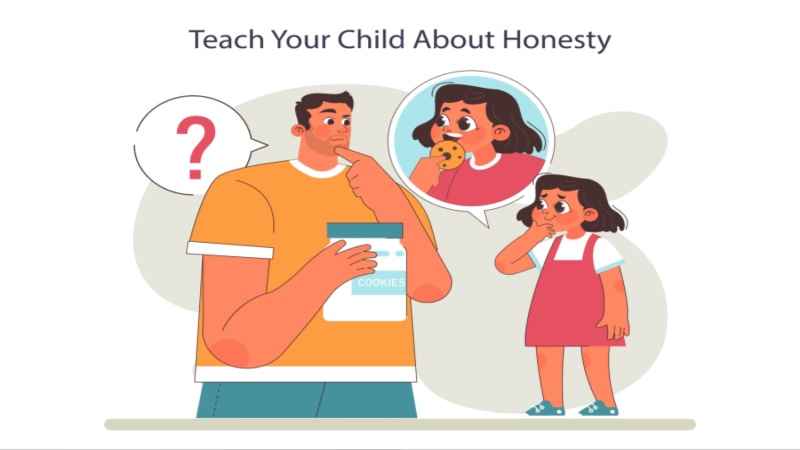
All mothers want their tiny tots to tell the truth and become honest beings. However, raising an honest kid is both rewarding and challenging. As parents, your biggest challenge is to model honest behavior in front of your toddler. As an essential parenting trait, you should be aware that they are constantly ‘watching you’. Your tiny one is absorbing what they see and perceive in their surroundings.
For this, you should avoid telling lies, or act dishonestly when they’re around. Creating a nurturing environment that celebrates openness and trust, you can instill values of integrity and a ‘no lie’ policy at home.
Why do Kids Lie?

When you sense your toddler making up stories and trying to hide the truth, it’s better to accept that lying in toddlerhood is not uncommon. Research has shown that toddlers as young as 42 months tend to tell a lie in various social situations (1).
Occasional lying is common when toddlers try to hide their mistakes or feel insecure about their naughty actions. They may lie just to feel safe. Their cognitive development tells them to hide things from elders that can become a source of rebuke from them (2). Some of the reasons behind lying are as follows:
- They want to avoid having trouble
- Toddlers may test boundaries and see what happens if they lie (3)
- Sometimes, lying can draw the attention of caregivers
- They lie because they do not want their parents to be upset or angry
- Toddlers may lie just to get what they want
Why is it Important to Teach Honesty to Kids?

It is important to teach honesty to toddlers and small kids because it paves the way for their truthful living.
- Honesty leads to trust building with peers and other elders (4)
- Helps to develop a sense of integrity and righteous living
- When kids learn honesty, they refrain from doing socially incorrect actions, those that can harm others
- It teaches responsible behavior while playing, in school, and in all walks of life
- Teaching honesty helps them understand the importance of telling the truth. It just feels great to say things the way they are
- Honesty and telling the truth can be taught by observational learning. If toddlers see others being authentic, it reinforces them to behave honestly (5)
What to do if Your Toddler Lies?

When toddlers lie, you can follow certain easy on-spot hacks to understand their subtle feelings. Few things you can try are:
- Respond with patience and listen to them
- Encourage them to share their feelings without chiding
- Offer examples of how they can best deal with the situation without telling a lie
- Avoid screaming, shaming, or comparing them to siblings or other toddlers
- Praise them when they’re breaking their fear barriers and trying to express what really happened
- Explain to them that honest speaking will make them feel confident and proud of themselves
12 Tips to Raise an Honest Kid
Teaching honesty demands your patience and considerable time. It is not as easy as teaching them daily routines. Creating a truthful atmosphere in your home is very important to raise your toddler to be an honest person.
1. Be a Role Model

For toddlers, parents are ideal and they naturally prefer to follow them. So you ought to be honest in front of them. You might think that you are honest, but you are probably far from being honest. In fact, some little white lies have become a part of our lives. However, they make a big impression on your little one’s mind.
2. Avoid Setting a Stage For a Lie
While raising an honest kid it is imperative that if you already know the answer, don’t ask them questions that might compel them to say a lie. Even grown-ups tend to lie when cornered. For example, if they are standing in front of a messy table with a dirty hand, don’t ask them who made that mess (which sounds ridiculous) demanding a full confession. Instead, you can say that it is very bad that they made the table dirty, and warn them not to do it again. This way, they may get the impression that they can’t hide anything from you.
3. Encourage Honesty
Talking about the importance of truth in every chance you get is a good idea. You can bring it up while watching their favorite (and appropriate) television show. Make them understand that the truth will always come out in the end and hiding a truth forever is impossible. Also tell them how the truthful people are respected by others. This way, you are creating a feeling within your toddler that honesty is the best policy naturally (6).
4. Read Them Stories About Honesty

One easy thing to do while raising an honest kid is to select and read stories which will teach the toddler the value of honesty. To make them understand and grasp your point, you can link the story with examples of something the toddler has done or witnessed (7).
5. Avoid Labeling Your Kid as a Liar
Never call them a liar. This will wear their self-respect down and make them defensive. Yes, your little one also has an ego and you should respect their feelings, and treat them as an individual. Instead, you can let them know that you are aware of their lies gently yet firmly. Moreover, judgmental labels tend to be identities that your toddler will grow up with in future (8).
6. Always Listen to Your Kid
It is very important to ask your toddler gently about the mistake they made. For this, you have to first make them comfortable. Listen to their side of the story and assure them that they mean more to you than the broken toy or watery floor and that all you are concerned about is their safety. You should assure the toddler that they need not be afraid to tell the truth. Praise them for being honest. Praise helps to build self-confidence and reinforces positive behavior (9).
7. Teach Your Kid Tact
Encourage your toddler to express themselves honestly but gently while dealing with others. Teach them how to share true feelings without hurting others’ feelings, reinforcing the importance of both honesty and kindness.
8. Create a Trusting Environment

At home, create a safe space where your toddler feels comfortable sharing their thoughts and feelings without the fear of being judged, rebuked, or punished. When your kid knows that parents are supportive and loving, they will open up easily.
9. Avoid Harsh Punishments
Foremost thing that parents should do while raising an honest kid is to strictly avoid severe punishments for lying. Use empathy and guidance instead of harsh punishments when mistakes occur. This prevents lying out of fear and encourages open, honest communication (10).
10. Admit When You Are Wrong
Be a model for honesty by acknowledging your own mistakes. When you’re wrong in some way, never feel hesitant to accept the mistakes. This shows your toddler that honesty is valued even when it’s uncomfortable.
11. Have Patience
Understand that learning honesty is a process and your little one will surely take time to learn truthful behavior overtime. For raising an honest kid, show patience as your tiny tot navigates challenges and learns from mistakes slowly.
12. Praise When They Are Honest

Parenting is not all that simple, and there will be incidents when speaking the truth will actually demand courage on your little one’s part. Appreciating and rewarding is a wonderful way to enforce positive reinforcement. Do that often, so that the toddler gets an understanding that doing good, begets good (11).
When toddlers lie, it is important to know the underlying reasons. At times, toddlers try to hide their true feelings and they lie just to avoid punishment or parents’ anger. As parent’s, raising an honest kid demands patience. Slowly, they will learn the benefits of honesty and how wonderful truth feels like as they mature. Every small moment of truthfulness becomes a process of lifetime learning for them.
FAQ’s
1. How to Punish a Child For Lying?
Instead of punishments, you can teach them to say the truth without fear. Show your patience and acceptance and allow them to speak their minds openly. Discuss their mistakes and help them correct their wrongdoings of lying on their own.
2. Why is my Child Lying?
Toddlers and young children lie for various reasons, such as fear of punishment, seeking attention, or avoiding responsibility. Understanding their motive is vital. It helps address the underlying issue and encourages open communication.
3. Is Lying Genetic?
No, lying is not genetic. Toddlers may tell a lie out of fear or by seeing others’ incorrect actions. Most often, lying is observed and then implemented. The way truth gets manipulated by elders at home impacts a toddler’s lying behavior.
4. At What Age is Lying Developmentally Appropriate?
Lying can begin by 24 months but increases by age 4 years. This is largely because toddlers get more exposure to the outside world and start experimenting with what they are allowed to do and what not.
5. How do I Get my Child to Admit They Are Lying?
You should stay calm and create a safe space of trust so that they are forced to share their true feelings to you. They should admit the truth without any fear. You can ask open-ended questions to verify their honesty.
References
-
- Evans AD, Lee K. Emergence of lying in very young children. Dev Psychol. 2013 Oct;49(10):1958-63. doi: 10.1037/a0031409. Epub 2013 Jan 7. PMID: 23294150; PMCID: PMC3788848. – https://www.ncbi.nlm.nih.gov/pmc/articles/PMC3788848/
- Liu Xue, Shang Siyuan, Zanette Sarah, Zhang Yongkang, Sun Qingzhou, Sai Liyang, An experimental investigation of association between children’s lying and behavior problems, Frontiers in Psychology, VOLUME=13, YEAR=2022, DOI=10.3389/fpsyg.2022.982012 – https://www.frontiersin.org/journals/psychology/articles/10.3389/fpsyg.2022.982012/full
- Writer: Beth Arky, Clinical Expert: Matthew H. Rouse, PhD, Child Mind Institute – https://childmind.org/article/why-kids-lie/
- Colleen Doyle Bryant, https://rootedindecency.com/ – https://rootedindecency.com/blog/values/teaching-value-of-honesty.html
- Ma F, Heyman GD, Jing C, Fu Y, Compton BJ, Xu F, Lee K. Promoting honesty in young children through observational learning. J Exp Child Psychol. 2018 Mar;167:234-245. doi: 10.1016/j.jecp.2017.11.003. Epub 2017 Nov 28. PMID: 29195112. – https://pubmed.ncbi.nlm.nih.gov/29195112/
- Tabroni, Imam & Nasihah, Fitriani. (2023). Training the Honest Character of the Child at Home. Indonesian Journal of Applied and Industrial Sciences (ESA). 2. 147-156. 10.55927/esa.v2i1.2824. – https://www.researchgate.net/publication/368479854_Training_the_Honest_Character_of_the_Child_at_Home
- Kang Lee, Victoria Talwar, Anjanie McCarthy, Ilana Ross, Angela Evans, and Cindy Arruda, Dr. Eric Jackman Institute of Child Study, University of Toronto, Department of Educational and Counselling Psychology, McGill University, and Department of Psychology, Brock University, Psychological Science 2014, Vol. 25(8) 1630–1636, DOI: 10.1177/0956797614536401 – https://ggsc.berkeley.edu/images/uploads/Lee_et_al_2014_Can_Classic_Moral_Stories_Promote_Honesty_in_Children.pdf
- Extension | University of Nevada, Reno, College of Agriculture, Biotechnology & Natural Resources – https://extension.unr.edu/publication.aspx?PubID=3011
- Benson-Goldberg, Sofia & Erickson, Karen. (2021). Praise in Education. 10.1093/acrefore/9780190264093.013.1645. – https://www.researchgate.net/publication/352039675_Praise_in_Education
- Victoria Talwar, Cindy Arruda, Sarah Yachison, Department of Educational and Counselling Psychology, McGill University, Montreal, Quebec H3A 1Y2, Canada – https://ggsc.berkeley.edu/images/uploads/Talwar_et_al_2015_The_effects_of_punishment_and_appeals_for_honesty_on_children%E2%80%99s_truth-telling_behavior.pdf
- Afrianingsih, Anita & Damayanti, Sehla. (2023). The Effectiveness of Providing Rewards and Punishment for Moral Development of Early Childhood. Child Education Journal. 5. 73-84. 10.33086/cej.v5i2.4223. – https://www.researchgate.net/publication/376605109_The_Effectiveness_of_Providing_Rewards_and_Punishment_for_Moral_Development_of_Early_Childhood

